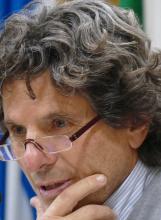What Is It
Niccolò Machiavelli is best known for arguing that people in power should use deception, force, and manipulation if those tactics are necessary to achieve their ends. In an age of unscrupulous politics and ruthless business practice, shouldn't we be encouraging a move away from Machiavellian thinking? Then again, are we even sure that those "Machiavellian" views were really Machiavelli's? If not, what did he really think, and what might we learn from him? John and Ken plot and scheme with Maurizio Viroli from Princeton University, author of Redeeming the Prince: The Meaning of Machiavelli's Masterpiece.
Listening Notes
John opens by referring to Machiavelli as a pragmatic visionary and champion of Republican liberty, but Ken sees Machiavelli's work, The Prince, as a manual for callousness for political ends. John regards this worry as partly a product of myth. After all, the saying that “the ends justify the means” never appears in Machiavelli’s work. Moreover, this idea of political strategy at the price of morals traces back to other thinkers like Plato. John argues that we need cunning and pragmatic leaders, even if that requires lying. But Ken argues that some sort of limit on cunning leaders' power must be imposed.
John and Ken are joined by Maurizio Viroli, author of Redeeming the Prince: The Meaning of Machiavelli’s Masterpiece. Maurizio argues that politicians should study Machiavelli because of his arguments against power, tyranny, and corruption, and to seek glory instead. Maurizio argues that the book concerns political redemption, written as a manual for rulers to reclaim their politics from foreign invaders. John asks Maurizio whether Machiavelli would have liked Mussolini, and Maurizio argues that Machiavelli would have detested Mussolini for one simple reason: Mussolini was a tyrant who was most interested in himself. Overall, Machiavelli never wrote highly of tyrants contemporary to his time or before. Instead, Maurizio references FDR and Abraham Lincoln as the kinds of leaders that Machiavelli would have supported, especially the latter for lying and providing misinformation to achieve a nobler goal. Furthermore, according to Maurizio, Machiavelli ought not to be considered a philosopher in the sense of how we usually understand the term; rather, Machiavelli was a political writer, playwright, and historian.
Roving Philosophical Reporter (Seek to 5:44): Natalie Jones takes a look at self-styled Machiavellians, especially Tupac Shakur, who rapped under the moniker "Makaveli" and who studied Machiavelli during his life.
60 Second Philosopher (Seek to 44:30): Ian Shoales looks at Machiavelli’s misfortunes in how The Prince was likely not read by the people that he gave it to, was not published until after his death, and how his views have been distorted over time.
Transcript
Transcript
Ken Taylor
Coming up…
Criminal Minds
Niccolò Machiavelli wrote, "If an injury has to be done to a man, it should be so severe that his vengeance need not be feared."
John Perry
Was Machiavelli an unscrupulous theorist and advisor?




Comments (1)
Harold G. Neuman
Monday, January 31, 2022 -- 6:13 AM
Inasmuch as Machiavelli isInasmuch as Machiavelli is credited with espousing ruthless and nefarious ways, I think I will research Foucault to see what he may have thought about the Italian.